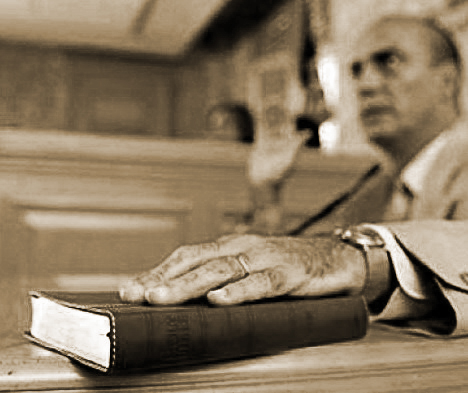
Jury Articles
A Jury's Evaluation of a Witness Is Not Limited to Testimony
Imagine moments after resting your case that your most important witness jeopardizes her credibility with the jury during a court recess. In a recent Post-Trial Juror Interview, a juror recounted just such an incident. Reportedly, this juror observed the Defense’s star witness fail to wash her hands after using the restroom. The real clincher was that this witness was a surgeon who had just finished testifying in her own Medical Malpractice trial. A juror witnessing such poor hygiene and sloppiness on the part of a medical doctor is going to have serious concerns about her habits and ethics at work. As unfortunate as it was for this juror to have witnessed the doctor’s carelessness, the story did not end there. The incident was obviously discussed among the jurors, because another juror reported the incident secondhand during her interview, too.
Although the jury is instructed to only consider testimony given during trial, it would be naïve to expect that they would be unaffected by behaviors observed outside of the courtroom. Jury Research and Post-Trial Interviews have shown repeatedly that the jury notices many details that escape the trial attorney’s eye. Sometimes the details that go by the wayside prove to be most embarrassing and even damaging to the case.
Testifying in court is a daunting task for most people, including well-educated professionals. Witnesses become so consumed with testifying that it hinders their self-awareness. Witnesses convey their anxiety about testifying in many ways during trial (e.g., appearing frazzled before the jury, wearing inappropriate attire or exercising poor grooming, speaking aloud during court sessions, seeming aloof or indifferent, etc.). The problem is that some of these inappropriate behaviors may have far reaching effects on the jury’s perception of the witness’ competency, which in turn may reduce the witness’ overall credibility. The scientific study of credibility assessment indicates that is more a function of what we do than what we say. The behavior of a witness provides crucial information about his/her competency. Once the perception of competency has been jeopardized, the witness’ credibility is on a shaky foundation and so is your case.
A surgeon failing to wash her hands and similar egregious acts serve as a reminder that witnesses are also being viewed and critiqued by the jury even when they are not on the witness stand. Witnesses, including expert witnesses, need to be educated on the expectations the jury will have of them. Your witnesses should understand that off the witness stand they are still subject to scrutiny by the jury. All common areas in a courthouse and nearby vicinity (e.g., the restroom, the elevator, the cafeteria, or even the parking lot) where jurors may be present can function like a witness stand providing the jury an added opportunity to evaluate the witness. The best advice is to counsel your witnesses to behave as though they are on the witness stand from the moment they arrive at the courthouse. Another good option is hire a Jury Consultant experienced in the art of witness preparation to assess, train and prepare witnesses for the rigors of trial testimony.
Witness Preparation under the aegis of a consultant provides the witness with the necessary tools to convey clearly and convincingly his/her testimony. In collaboration with counsel, the witness is led through a mock examination exercise. The examination is videotaped and evaluated by the consultant, analyzing both the verbal and non-verbal behavior of the witness. While reviewing the videotaped practice session, the witness is provided with feedback and strategies to enhance his/her communication and credibility. The witness is also educated on the expectations a jury will have; the consultant offers suggestions as to how to meet those expectations. Witness Preparation, from a behavioral perspective, results in witness testimony that is both credible and persuasive.
In summary, here are some considerations:
- Educate your witness on what the jury will expect of them, given their role on the trial;
- Avoid intense discussions with the witness within purview of the jury;
- Inform your witness on the formality of the court proceeding;
- Advise your witness to always be on hisher best behavior while on the courthouse premises; and
- If possible, hire a jury consultant, well-versed on witness preparation.

by Cynthia G. Veneciano, Ph.D.
